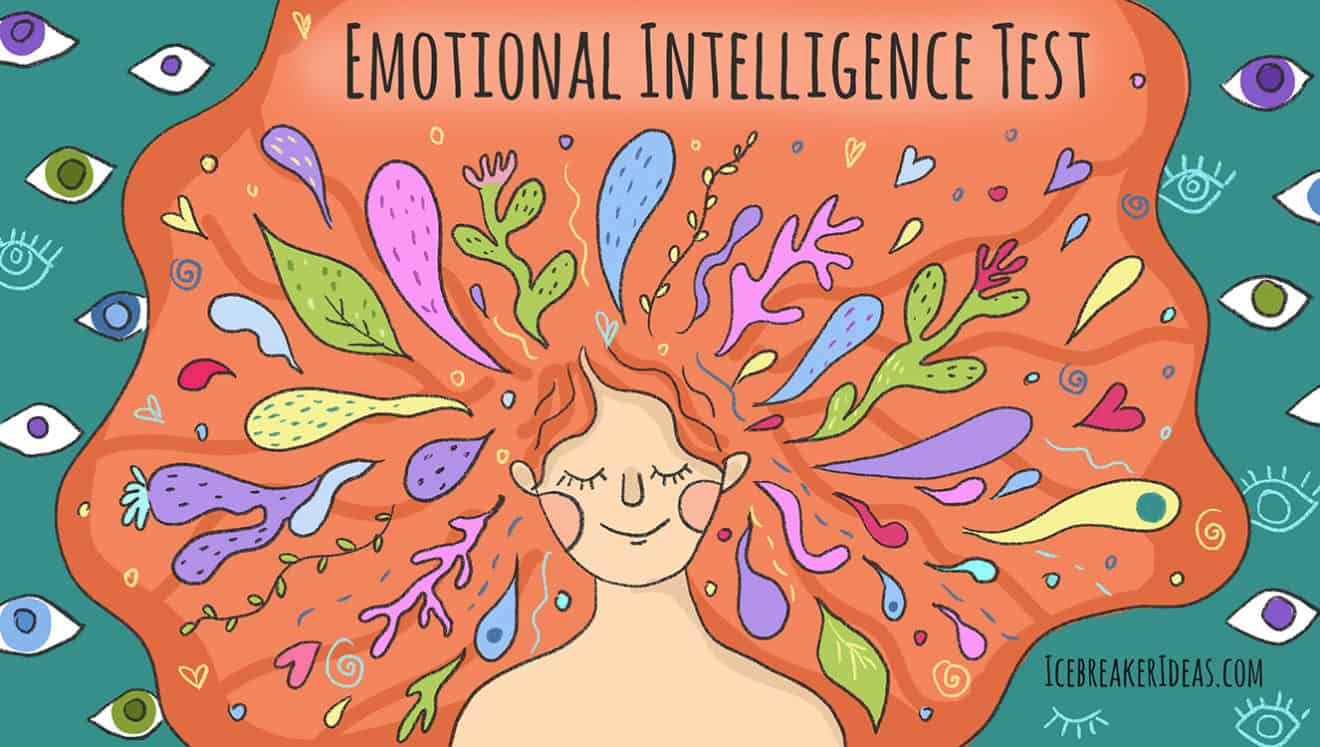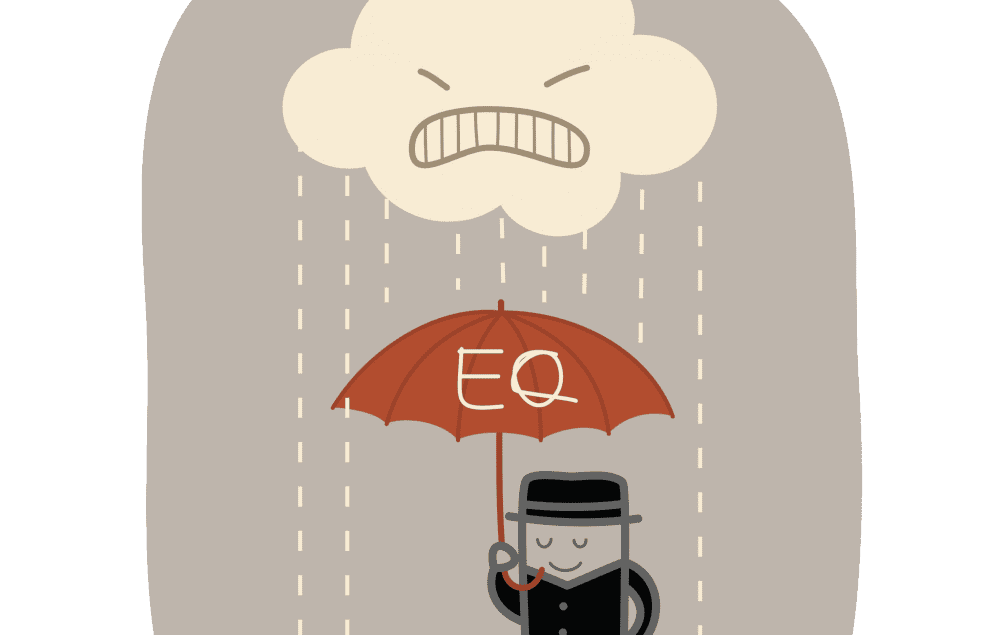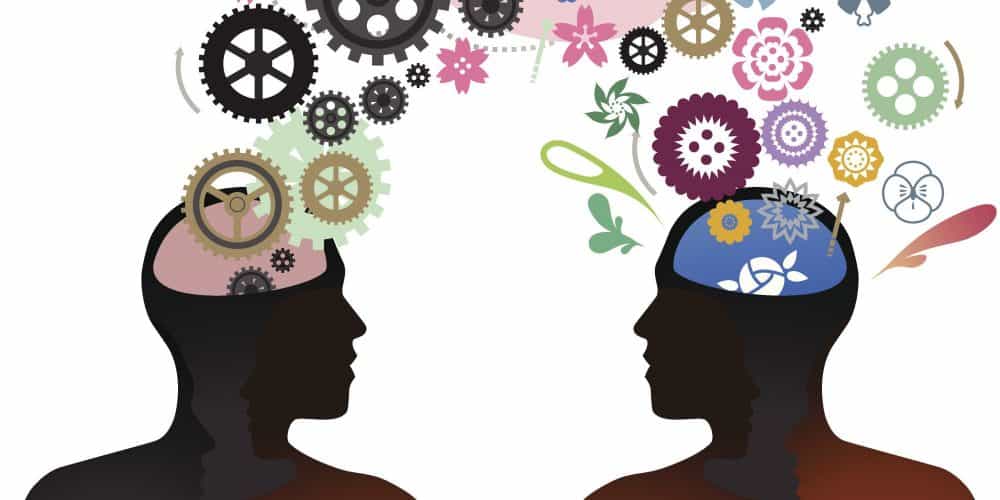You may be wondering what is emotional intelligence. Emotional intelligence (EI) is one’s ability to identify, understand, use, and manage emotions in positive ways. Emotional intelligence relieves stress, helps one communicate effectively and empathize with others, overcome challenges, and prevent and defuse conflict. Additionally, emotional intelligence allows the recognition and understanding of what others are experiencing emotionally, providing a connection to others.
Table of Contents
Emotional intelligence is commonly defined by four attributes:
- Social awareness. Understanding the emotions, concerns, and needs of other people by:
- Feeling comfortable socially
- Picking up on emotional cues
- Recognizing the power dynamics in groups
- Relationship management. Developing and maintaining good relationships by:
- Communicating clearly
- Influencing and inspiring
- Managing conflict
- Working well in a team
- Personal competence. Focuses on your emotions and your interactions with other people and consists of self-awareness and self-management.
- Self-awareness. Your ability to use your emotional awareness to:
- Have self-confidence
- Know how your emotions affect your behavior and thoughts
- Know your strengths and weaknesses
- Perceive your emotions accurately
- Self-management. Your ability to use emotional awareness to:
- Adapt to change
- Control impulsive behaviors and feelings
- Direct your behavior in a positive manner
- Follow through on commitments
- Take the initiative
- Self-awareness. Your ability to use your emotional awareness to:
- Social competence. Social competence is your ability to use emotional intelligence in your relationships with others and consists of:
- social awareness – the ability to understand the moods and behavior of others
- relationship management skills – the ability to improve the quality of your relationships with others
The Differences between Emotional Intelligence, Intelligence, and Personality
Emotional intelligence involves your behavior, whereas your IQ is your level of intelligence. There is no known connection between your IQ and your emotional intelligence (EI). Your IQ is our ability to learn and remains the same throughout your life. However, your EI is a flexible set of personal and social skills one can acquire and improve upon with practice. One may naturally have emotional intelligence, but if they do not, they can develop high emotional intelligence.
Personality is our hard-wired preferences, such as an inclination towards extroversion or introversion. This final piece of our being is the style that defines you. Personality cannot predict one’s emotional intelligence and remains relatively stable over a lifetime. Together, IQ, emotional intelligence, and personality explain what a person is like and how they will react.
People assumed IQ was the sole source of personal success. However, people with average IQs outperformed those with high IQs 70% of the time. In 1995, it was disclosed that the high performers had high levels of emotional intelligence. Now, after decades of research, experts recognize that emotional intelligence is the critical factor that characterizes star performers.
The Importance of Emotional Intelligence
The previous section explained why the smartest people are not always the most successful or the most fulfilled people in life. We all know someone who is brilliant but socially inept. Such individuals are unsuccessful at work and/or in their personal relationships. Emotional intelligence affects almost every area of one’s life. Consider the following:
- School and Work Performance. Emotional intelligence is considered so important that some companies test a candidate’s emotional intelligence as part of the hiring process. Emotional intelligence helps students and employees:
- Excel in their performance
- Motivate and lead others
- Navigate social complexities
- Physical Health. Poor emotional intelligence can lead to stress – a leading factor contributing to poor health and problems such as:
- Increased blood pressure
- Suppression of the immune system
- Increased risk of heart attack and stroke
- Infertility
- Accelerated aging
- Mental health. Stress and uncontrolled emotions impacts mental health.
- Causes the inability to form strong relationships
- Contributes to anxiety and depression
- Creates feelings of loneliness and isolating
- Relationships. Emotional intelligence makes it possible for your to not only express how you feel, but also understand the feelings of others. This helps you:
- Communicate effectively with others
- Create strong relationships in your personal and professional life
Emotional Intelligence Test
Now that we have defined what emotional intelligence is and how important it is, we need to find out how emotionally intelligent you are. Our emotional intelligence quiz is composed of twenty questions covering your emotional reactions and responses. Additionally, you are given situations you may encounter in your personal and professional life and choices of ways to handle them. Make sure you answer completely and honestly. When you add up your score, you will find out how emotionally intelligent you are. Then you will be able to decide if you need to work on increasing your emotional intelligence and follow our guidelines for doing so.
Reactions
The following two questions determine your emotional reactions.
- When criticized, I:
- Ignore the criticism
- Listen and learn
- Become defensive
- Get angry
Give yourself 3 points for A, 4 for B, 2 for C, and 1 for D.
- In a difficult situation, I:
- Get scared
- Retreat if possible
- Maintain a positive attitude
- Let others take the lead
Give yourself 1 point for A, 2 for B, 4 for C, and 3 for D.
Your score for this section: __________
Responses
When faced with situations, we react emotionally.
- When pursuing a goal, I am able to manage anxiety, anger, fear, and stress.
- Strongly Disagree
- Disagree
- Neither Agree nor Disagree
- Agree
- I am able to utilize feedback and criticism to grow personally and professionally.
- Strongly Disagree
- Disagree
- Neither Agree nor Disagree
- Agree
- I maintain a sense of humor at appropriate times and in appropriate places, without using sarcasm or hurting the feelings of others.
- Strongly Disagree
- Disagree
- Neither Agree nor Disagree
- Agree
- I am able to see things from another person’s perspective.
- Strongly Disagree
- Disagree
- Neither Agree nor Disagree
- Agree
- I recognize how my behavior affects others emotionally.
- Strongly Disagree
- Disagree
- Neither Agree nor Disagree
- Agree
- When I have a complaint, I am capable of expressing it properly.
- Strongly Disagree
- Disagree
- Neither Agree nor Disagree
- Agree
- I listen to others with patience and understanding.
- Strongly Disagree
- Disagree
- Neither Agree nor Disagree
- Agree
Give yourself 1 points for each A, 2 point for each B, and 3 points for each C, and 4 points for each D.
Your score for this section: __________
When presented with a situation, we can describe our emotional reaction. The following questions help you do so.
- I have a great deal of discipline and I am self-motivated.
- Never
- Sometimes
- Often
- Always
- In stressful situations, I do not get irritated easily and I am able to contain my emotions.
- Never
- Sometimes
- Often
- Always
- Even if I believe I am right about something, I make an effort to listen to other people’s viewpoints.
- Never
- Sometimes
- Often
- Always
Give yourself 1 point for each A, 2 points for each B, 3 points for each C, and 4 points for each D.
Your score for this section: __________
Situations
Now we are going to look at some situations and determine how you would react.
- Two of your friends are having an argument. Your response is to . . .
- Try to help each one understand the other’s one’s point of view
- Avoid both of your friends until they quit fighting
- Choose a side and bad-mouth the other person
- Let both of them vent their emotions to you
Give yourself 4 points for A, 2 points for B, 1 point for C, and 3 points for D.
- Your friend tells you her mother has died. Your response is to . . .
- Allow your friend to express her emotions and offer your support
- Convince your friend to go out somewhere with some friends to get her mind off of her loss
- Give your friend some time alone
- Spend time with her, but avoid talking about her loss
Give yourself 4 points for A, 1 point for B, 2 points for C, and 3 points for D.
- You are faced with an unpleasant task. Your response is to . . .
- Make a plan and work on the task a bit each day
- Put completion of the task off until the last minute
- Get the task over with as soon as possible
- Not do the task at all
Give yourself 4 points for A, 2 points for B, 3 points for C, and 1 point for D.
- You find yourself involved in a heated discussion. Your response is to . . .
- Ask for a short break before resuming the discussion
- Give in and apologize because you want to end the argument
- Insult the other person
- Get quiet and stop responding to the other person
Give yourself 4 points for A, 3 points for B, 1 point for C, and 2 points for D.
- Although you work hard on an assignment, you get a bad grade. Your response is to . . .
- Think about ways you could have improved your work and received a better grade
- Confront the teacher, asking for a better grade
- Feel disappointed and criticize your own work
- Decide the class is stupid and stop putting working hard on assignments
Give yourself 4 points for A, 3 points for B, 2 points for C, and 1 point for D.
- Your friend at work has an annoying habit. Every day it seems more annoying and worse. Your response is to . . .
- Tell your friend about her annoying habit and why it bothers you
- Make a complaint to her supervisor
- Talk about your coworker’s annoying habit to others
- Suffer silently
Give yourself 4 points for A, 3 points for B, 1 point for C, and 2 points for D.
- You are already involved in many tasks and projects and feel overworked when your boss assigns you big new project. You feel . . .
- Worried that you will never get all the work done
- Completely overwhelmed by the task before you
- Angry at your boss because he has not noticed how overworked you are
- Deeply depressed and sure you will never finish it all
Give yourself 4 points for A, 3 points for B, 2 points for C, and 1 point for D.
- You work hard on a project and the person with whom you are working publically takes credit for work you did. Your response is to . . .
- Immediately and publicly confront the person about the ownership of the work
- Take the person aside and tell them you want them to credit you when talking about your work
- Do nothing
- After the person finishes speaking, thank her immediately for sharing your work and then give the group more details
Give yourself 2 points for A, 3 points for B, 1 point for C, and 4 points for D.
Your score for this section: _________
Now add up all of your points to see how high your emotional intelligence is. Put your score here _____.
If your score is between 68 and 80:
You have extremely high emotional intelligence. You are skilled at understanding, interpreting, and acting appropriately upon your emotions and those of others. You deal effectively with emotional and social situations and conflicts, and express your feelings without hurting the feeling of others.
If your score is between 60 and 68:
Although you score relatively high, you do have room for improvement. Watch the reactions of others to determine when you are using your emotional intelligence effectively and when you are not. Objectively looking at social and personal situations where emotions run high and analyzing your success will help you improve your already high emotional intelligence even more.
If your score is between 48 and 60:
You fall in the middle range when it comes to your emotional intelligence. Although you are responding appropriately in most situations, your still find yourself losing it sometimes. You also get impatient with others and are sometimes uncomfortable in emotional situations. Don’t worry. Our section on developing your emotional intelligence will help you reach a high level.
If your score is between 40 and 48:
Your emotional intelligence is a bit low. You probably struggle to manage your emotions in high pressure situations or when you get angry. You have some work to do to improve. Begin by trying to express your emotions after you are calm. Our section on developing your emotional intelligence will help you a great deal.
If your score is below 40:
Your emotional intelligence is extremely low. You are probably experiencing anxiety and stress on a daily basis. Additionally, you are probably having difficulty in school or at work, not making the progress you wish to. Read carefully through our section on developing your emotional intelligence and follow our advice to improve your EI and have a happier, more meaningful and successful life.
No matter how high or low your score, you can increase your emotional intelligence by learning more about how you respond in various situations. Additionally, an increase in emotional intelligence can help you do better in your job or in school.
Building Emotional Intelligence
Even if you understand what emotional intelligence is, you may find it difficult to apply that knowledge to your life. In order to permanently change and improve one’s emotional intelligence, one must not only build their emotional and social awareness, but also learn to manage their relationships, and develop personal and social competence. Consider the following ways of doing so.
Building Social Awareness
As mentioned previously, social awareness is the ability to pick up on nonverbal emotional cues others send. When you are able to do so, you can read and understand your own and other’s emotional signals. You can build your social awareness by:
- Suspending your thoughts in order to experience nonverbal cues of others as they change from one moment to the next.
- Not thinking about your own goals and objectives when you are with other people, but having concern for theirs.
Developing Relationship Management
- Become Aware of How to Effectively Use Nonverbal Communication. Nonverbal communication is sending emotional signals through the muscles in your face and the posture of your body. It is important to recognize the kind of non-verbal message we send to others in order to improve our emotional relationships.
- Use Humor and Laughter. When you are stressed, you have trouble keeping things in perspective. Humor, play, and laughter bring your nervous system back into balance, which means you can sharpen your mind and calm down. You are then able to be more empathetic.
- View Conflict as an Opportunity. Conflict helps us build relationships when we see conflict as an opportunity to grow closer to others. Learn to view conflict positively, as a method to build feelings of freedom, creativity, and safety in your relationships.
Building Personal Competence with Self-awareness and Self-management
Self-awareness can be improved by paying attention to what you experience emotionally as you listen to others. This also illuminates your own beliefs and values. Self-management improves when you are able to connect to your emotions and understand how emotions influence your thoughts and actions. Both self-awareness and self-management are essential for improving emotional intelligence.
Developing Social Competence
Social competence, your ability to use emotional intelligence in your relationships with others, can be developed by learning social awareness, which is the ability to understand the moods and behaviors of others. To do so, learn:
- To look for ways to determine how other people are feeling
- Empathy
- That feelings have causes
Additionally, you need to improve your relationship management skills. Do so by:
- Developing open, honest, trusting relationships
- Having self-respect and showing respect to others
- Having good communication skills – listening, assertiveness, and conflict management
- Being a good team member and encouraging collaboration
If you are having trouble with your emotions, they may be turned down or turned off. Emotional health comes from reconnecting to your core emotions, accepting them, and becoming comfortable with them. Once you develop emotional intelligence, you will be able to make choices that allow you to:
- manage your emotions in healthy ways
- control impulsive feelings and behaviors
- take the initiative
- follow through on commitments
- adapt to changing circumstances
People have emotional reactions to events before their rational mind is able to engage. The brain grows new connections when you learn new skills. When you train your brain by repeatedly using new emotional intelligence strategies, emotionally intelligent behavior becomes a habit.
When you work to increase your emotional intelligence, you see results in both your personal and professional life. It is a fact that those with high emotional intelligence not only have more career success, but also make more money. When emotional intelligence was tested alongside 33 other important workplace skills, it was found that emotional intelligence is the strongest predictor of performance, explaining 58% of success in all types of jobs. Additionally, 90% of top performers are also high in emotional intelligence. These high performers also make more money than lower performers.
Your life is driven by your emotions. If you understand your emotions, you can effectively relate to others and are able to keep your emotions under control. Understanding the power of emotional intelligence allows you to use it to your advantage. Emotional intelligence allows you to control impulsive feelings and behaviors, manage emotions in healthy ways, take initiative, follow through on commitments, and adapt to change. With emotional intelligence, you can achieve success and fulfillment in both your personal and professional life. Start today to build better emotional intelligence.
It is important to remember that there is a difference, however, between learning about emotional intelligence and applying that knowledge to your life. Just because you know you should do something doesn’t mean you will—especially when you become overwhelmed by stress, which can override your best intentions. In order to permanently change behavior in ways that stand up under pressure, you need to learn how to overcome stress in the moment, and in your relationships in order to remain emotionally aware.
What is social intelligence and why does it matter?
Social intelligence is closely related to emotional intelligence. Our emotions evolved to serve a social purpose that enables us, as humans, to survive. The ability to recognize friend from foe, to reduce stress, and return our nervous system to a state of balanced equilibrium and to feel loved and happy is essential. These essential abilities all depend on successful emotional communication that is nonverbal and connects you to other people and their emotions.
Social emotional communication can instantly convey: The friendliness or unfriendliness of another person
Another person’s interest in us
Another person’s caring for or about us
Personal and social attributes play off one another. The world is a social place and we are social beings.
Building emotional intelligence with self-awareness
Attachment and adult relationships
The science of attachment teaches that present day emotional experience is a reflection of early life emotional experience. Your ability to experience core feelings like anger, sadness, fear, and joy most likely depends on the quality and consistency of your early life emotional experiences. If your emotions were understood and valued, your emotions became valuable assets later in life. But, if your emotional experiences were confusing, threatening or painful, you most likely did your best to distance yourself from them.
Being able to connect to your emotions—having a moment-to-moment connection with your changing emotional experience—is the key to understanding how emotion influences your thoughts and actions.
If any of these experiences are unfamiliar, your emotions may be turned down or turned off. In order to be emotionally healthy and emotionally intelligent, you must reconnect to your core emotions, accept them, and become comfortable with them.
Mindfulness practice builds self-awareness as it reduces stress
Mindfulness is the practice of purposely focusing your attention on the present moment—and without judgment. The cultivation of mindfulness has roots in Buddhism, but most religions include some type of similar prayer or meditation technique. Mindfulness helps shift your preoccupation with thought toward an appreciation of the moment, physical and emotional sensations, and brings a larger perspective on life. Mindfulness calms and focuses you, making you more self-aware in the process.
Developing emotional awareness
If you haven’t learned how to manage stress, it’s important to do so first. When you can manage stress, you’ll feel more comfortable reconnecting to strong or unpleasant emotions and changing the way you experience and respond to your feelings.
Building emotional intelligence using self-management
Being emotionally aware is just the first step to emotional management. In order for you to engage your emotional intelligence, you must also be able use your emotions to make constructive decisions about your behavior. When you become overly stressed, you can lose control of your emotions and the ability to act thoughtfully and appropriately.
Think about a time when you have been overwhelmed by stress. Was it easy to think clearly or make a rational decision? Probably not. This is because while your brain can manage feeling and thinking at the same time, when we become overly stressed, our ability to both think clearly and accurately assess emotions—our own and other people’s—becomes compromised.
Susan majored in English with a double minor in Humanities and Business at Arizona State University and earned a Master’s degree in Educational Administration from Liberty University. She taught grades four through twelve in both public and private schools. Subjects included English, U.S. and world history and geography, math, earth and physical science, Bible, information technologies, and creative writing.
Susan has been freelance writing for over ten years, during which time she has written and edited books, newspaper articles, biographies, book reviews, guidelines, neighborhood descriptions for realtors, Power Point presentations, resumes, and numerous other projects.




I found very interesting your Emotional Intelligence Test, I wonder if I could use it between secondary schools students in Peru, of course I have to translate it into spanish.
Many thanks in advance.
Its a good test
It was a good test
I found this test to be a very interesting. It made me stop and think about how I react in different situations and made me aware of certain areas that I could improve on.